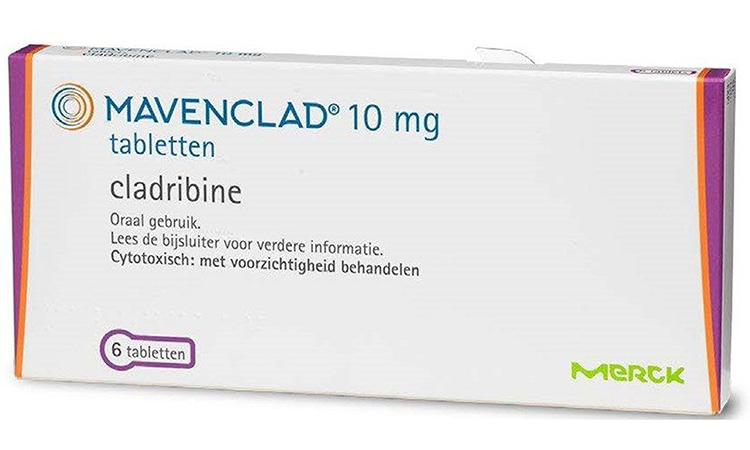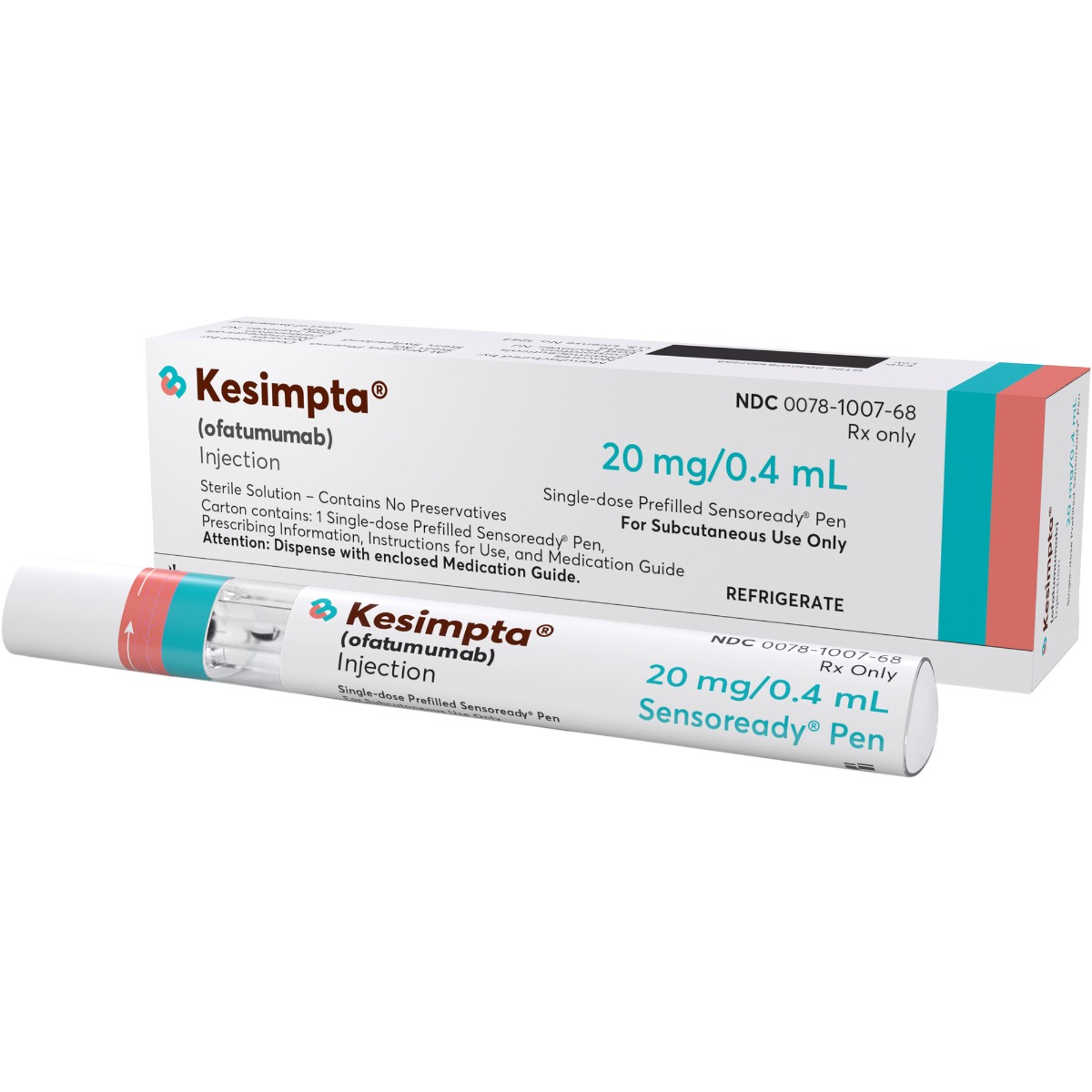Mavenclad (cladribine) vs Kesimpta (ofatumumab)
Mavenclad (cladribine) vs Kesimpta (ofatumumab)
Mavenclad (cladribine) and Kesimpta (ofatumumab) are both used in the treatment of multiple sclerosis (MS), but they work in different ways. Mavenclad is an oral medication that selectively targets lymphocytes thought to be involved in the pathological process of MS, and is taken in two treatment courses, one year apart. Kesimpta, on the other hand, is a once-monthly subcutaneous injection that targets CD20-positive B cells, which are also implicated in the MS disease process; it is designed for continuous use. When deciding between the two, a patient should consider factors such as the route of administration, frequency of dosing, side effect profile, and their own lifestyle and preferences, in consultation with their healthcare provider.
Difference between Mavenclad and Kesimpta
| Metric | Mavenclad (cladribine) | Kesimpta (ofatumumab) |
|---|---|---|
| Generic name | Cladribine | Ofatumumab |
| Indications | Multiple Sclerosis (MS) | Relapsing forms of Multiple Sclerosis (MS), including clinically isolated syndrome, relapsing-remitting disease, and active secondary progressive disease |
| Mechanism of action | Antimetabolite; purine analog that disrupts DNA synthesis and repair, leading to cell death, particularly in lymphocytes | CD20-directed cytolytic antibody; binds to the CD20 molecule on B cells, leading to cell lysis |
| Brand names | Mavenclad | Kesimpta |
| Administrative route | Oral | Subcutaneous injection |
| Side effects | Lymphopenia, leukopenia, infections, liver enzyme elevations | Injection site reactions, upper respiratory tract infections, headache, and urinary tract infections |
| Contraindications | HIV infection, active chronic infections, hypersensitivity to cladribine | Hypersensitivity to ofatumumab or to any of its excipients, active hepatitis B infection |
| Drug class | Antimetabolite | Monoclonal antibody |
| Manufacturer | Merck | Novartis |
Efficacy
Mavenclad (Cladribine) for Multiple Sclerosis
Mavenclad (cladribine) is an oral medication approved for the treatment of relapsing forms of multiple sclerosis (MS), including relapsing-remitting disease and active secondary progressive disease in adults. Clinical trials have demonstrated the efficacy of Mavenclad in reducing the rate of relapses, slowing the progression of disability, and decreasing the number of lesions as seen on MRI scans. The CLARITY study, a key phase III clinical trial, showed that cladribine significantly reduced annual relapse rates by 58% when compared to placebo. Additionally, it was observed that Mavenclad reduced the risk of 3-month sustained progression of disability by 33% compared to placebo.
The convenience of Mavenclad's dosing schedule is also noteworthy. It is administered in two treatment courses, approximately one year apart, each consisting of a maximum of 20 days of treatment over a two-year period. This short-course oral therapy has been found to have a sustained effect on disease activity for up to four years, which is a significant advantage for patients in terms of adherence and quality of life.
Kesimpta (Ofatumumab) for Multiple Sclerosis
Kesimpta (ofatumumab) is a subcutaneously injected monoclonal antibody approved for the treatment of relapsing forms of multiple sclerosis, including clinically isolated syndrome, relapsing-remitting disease, and active secondary progressive disease. Ofatumumab works by targeting CD20-positive B cells, which are believed to play a key role in the pathophysiology of MS. In the ASCLEPIOS I and II phase III trials, Kesimpta demonstrated a significant reduction in annual relapse rates compared to teriflunomide, another MS medication, with reductions of 50.5% and 58.5% respectively in the two studies.
Moreover, Kesimpta showed benefits in slowing the progression of disability and reducing the number of new or enlarging T2 and gadolinium-enhancing lesions on MRI. The convenience of Kesimpta's dosing, which is initially administered weekly for three weeks and then monthly thereafter, allows patients to self-inject at home, which can be an important consideration for those seeking a treatment that fits into their lifestyle. The efficacy and convenience of Kesimpta make it a valuable addition to the range of treatments available for MS.
Regulatory Agency Approvals
Mavenclad
-
European Medical Agency (EMA), European Union

-
Food and Drug Administration (FDA), USA

-
Health Canada

-
Therapeutic Goods Administration (TGA), Australia

-
Medsafe (NZ)

Kesimpta
-
European Medical Agency (EMA), European Union

-
Food and Drug Administration (FDA), USA

Access Mavenclad or Kesimpta today
If Mavenclad or Kesimpta are not approved or available in your country (e.g. due to supply issues), you can access them via Everyone.org.
How it works

Make an enquiry
Choose the medicine you want to buy, answer a couple of questions, and upload your prescription to speed things up. We’ll get back to you within 24 hours.


Make an enquiry
Choose the medicine you want to buy, answer a couple of questions, and upload your prescription to speed things up. We’ll get back to you within 24 hours.


Breeze through the paperwork
We'll guide you through the required documents for importing unapproved medicine, ensuring you have all the necessary information.


Get a personalized quote
We’ll prepare a quote for you, including medicine costs and any shipping, administrative, or import fees that may apply.


Receive your medicine
Accept the quote and we’ll handle the rest - sourcing and safely delivering your medicine.

Some text on this page has been automatically generated. Speak to your physician before you start a new treatment or medication.
Let's talk
If you have any questions, call us or send us a message through WhatsApp or email:
Contact us




